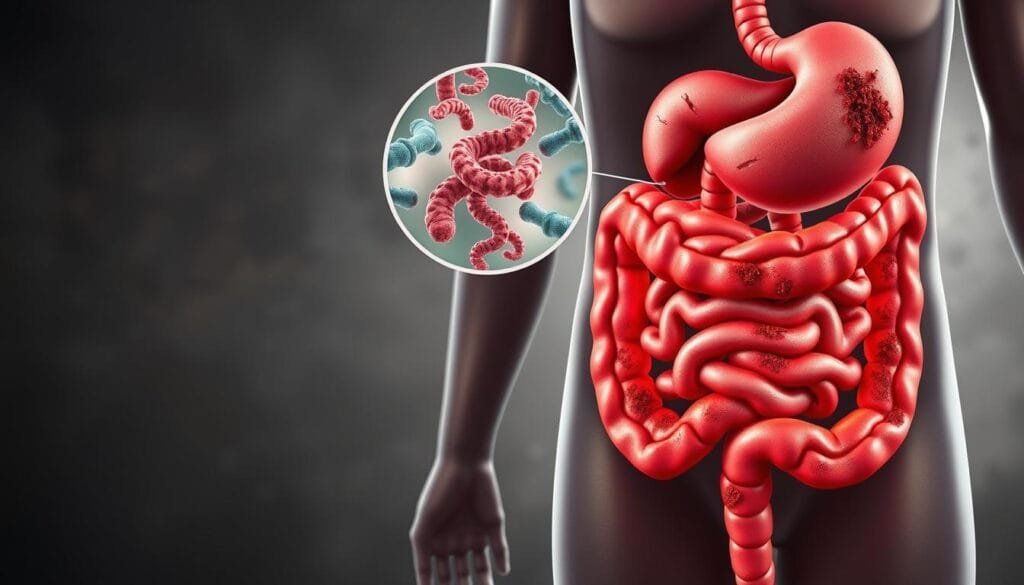Currently Empty: RM0.00
One in three people may notice changes in digestion or skin when friendly gut bacteria dip below ideal levels — a striking sign that microbiome balance matters.
Low probiotics often show as routine digestive upsets like diarrhea or constipation. These signs can link to sleep trouble and mood shifts through the gut-brain axis.
Researchers tie reduced beneficial bacteria to more colds, skin flares, and even weight changes. Certain strains such as Lactobacillus and Bifidobacterium have tracked benefits, though results vary by person and timeframe, often six to eight weeks.
Wellness Concept offers friendly, local guidance in Malaysia. For quick help, people may contact WhatsApp +60123822655 during business hours. This guide previews how foods, targeted supplements, and daily habits support gut health and overall health, and when to consult a professional.
Key Takeaways
- Low probiotics can affect digestion, sleep, mood, skin, and immunity.
- Strain choice and time matter — some benefits appear in 6–8 weeks.
- Fermented foods and evidence-aligned supplements may help restore balance.
- Daily habits like diet, stress, and antibiotics shape the microbiome.
- Local, practical support is available via Wellness Concept on WhatsApp.
- Restore balance for clearer signs and gradual improvements in overall health.
At a glance: gut microbiome basics and why probiotics matter
A balanced gut microbiome quietly steers digestion, immunity, and even mood each day. This living community of microbes helps break down food, makes vitamins, and sends signals along the gut-brain pathway.
How beneficial gut bacteria support digestion, immunity, and mood
Probiotics are live microorganisms linked to clear health benefits. They add friendly cultures that can ease bloating for some people and help normal bowel patterns when used consistently.
Good bacteria also turn fiber into short-chain compounds, support vitamin production, and reinforce the intestinal barrier. This activity helps immune signaling and influences serotonin production in the gut, which can affect sleep and mood.
Malaysia-focused context: diet, antibiotics, and lifestyle at present
Local diets, frequent antibiotic use, and stress commonly disrupt the microbiome in Malaysia. Small, steady changes—regular modest portions of yogurt, kimchi, tempeh, or kombucha plus prebiotic-rich leeks, garlic, and whole grains—usually work better than large, sporadic servings.
For quick, local advice, readers may message Wellness Concept on WhatsApp during business hours for a short primer about choosing foods and simple nutrition steps to support gut health.
What are the symptoms of lack of probiotics?
Early signals can surface across digestion, sleep, mood, and skin when helpful microbes fall below ideal levels.
A quick checklist helps people track patterns over two to four weeks. This reveals whether occasional slips or a steady change in gut health needs attention.
- Digestive signs: recurring bloating, excess gas, and abdominal discomfort suggest the gut is out of balance.
- Bowel changes: constipation, loose stools, or infrequent elimination that persist beyond short-term dietary shifts.
- Sleep disruption: trouble falling or staying asleep can reflect gut-brain links and altered serotonin-to-melatonin timing.
- Mood shifts: low resilience to stress, anxiety, or brain fog may follow microbiome changes; some studies show benefits from probiotic support for depression and anxiety in certain people.
- Skin reactions: new or worse acne, eczema, or rosacea often mirror internal microbial imbalance.
- Weight and immunity: gradual weight changes or more frequent minor infections can signal broader health effects.
Small, steady dietary moves—more plant variety and fermented foods—often ease issues before advanced steps. For a tailored checklist review, contact Wellness Concept on WhatsApp at +60123822655 during business hours.
Digestive red flags: bowel changes that signal low good bacteria
Persistent changes in stool or digestion often point to shifts in the gut microbiome that affect daily comfort and overall health.

Bloating, excess gas, and abdominal discomfort
Regular bloating and excess gas after normal meals can indicate reduced diversity of good bacteria. The gut may struggle to process fibers and certain sugars.
Diarrhea, constipation, and infrequent elimination
Diarrhea that lasts past a short illness or recurring constipation and swings between hard and loose stools are clear bowel red flags. These patterns suggest the balance of bacteria in the gut needs rebuilding.
IBS-like symptoms and when to consider probiotic support
IBS-like cramping, urgency, or erratic bowel habits may improve with targeted probiotics. Certain Lactobacillus, Bifidobacterium, and Saccharomyces strains show benefit in a study for pain and stool consistency.
- Start with foods — add fermented options and soluble fiber before jumping to probiotic supplements.
- Expect 6–8 weeks when taking probiotics to judge effect; pause and reassess if things worsen.
- Seek care for severe pain, blood in stool, or rapid weight loss.
Wellness Concept can guide product choices and meal pairing via WhatsApp at +60123822655 during business hours before starting any new supplements.
Sleep and mood shifts: the gut-brain axis in action
Shifts in gut communities can quietly disrupt sleep cycles and leave someone feeling foggy by day. The gut-brain connection links microbial signals to neurotransmitter production, including serotonin, which helps set melatonin timing and nightly rest.
Trouble falling or staying asleep, disrupted sleep-wake cycle
People may notice trouble winding down or waking often at night when gut balance changes. Early studies and animal research suggest certain probiotics can reduce sleep disturbances and anticipatory stress in some cases.
Simple habits help: steady bed and wake times, light daytime activity, and a small prebiotic-rich evening meal can support sleep while the microbiome recovers.
Mood swings, anxiety, low mood, and brain fog
Changes in bacteria may affect daytime mood and focus via serotonin pathways. Some trials link probiotic use to fewer anxiety or depression symptoms, though results vary and often help only some people.
Track changes for six to eight weeks to judge any benefit from food or supplements. If severe mood or sleep issues persist, they should see a clinician. For local, practical guidance on food-first steps or suitable products, message Wellness Concept on WhatsApp at +60123822655 during business hours.
Immunity and infection: when your system needs microbiome backup
A shifting gut community can change how well the immune system fends off everyday bugs. A balanced microbiome helps check harmful bacteria and tones down excess inflammation so the body responds more calmly to exposures.
Frequent colds, sore throats, or slow recoveries can be practical signs that the gut needs support. Increasing fermented foods and a wider plant variety gives protective microbes steady fuel.
How probiotics help and what to expect
- The gut and immune system constantly interact; friendly microbes block pathogens and protect the barrier.
- Probiotics may modulate inflammation and strengthen defenses, but strain and dose influence results — outcomes vary by person and by study.
- Early steps: add foods like yogurt or tempeh, improve sleep, manage stress, and keep hygiene consistent.
If infections are unusually frequent or severe, medical evaluation is advised. For local product or meal ideas to support resilience, message Wellness Concept on WhatsApp at +60123822655 during business hours.
Skin and weight signals linked to an imbalanced microbiome
Changes in complexion or gradual weight shifts sometimes trace back to an imbalanced microbiome. The skin and gut both host bacterial communities that affect immune responses and inflammation.

Acne, eczema, rosacea, and skin inflammation
Flare-ups such as acne, eczema, or rosacea can mirror a shifted gut. The skin’s bacteria interact with the immune system, so imbalance may raise inflammation and prolong skin issues.
Maternal probiotic use has been linked in research to lower eczema risk in infants, supporting the idea that probiotics can protect skin across life stages.
Unexplained weight gain or stubborn plateaus
A changed gut profile may alter appetite cues and how the body extracts energy, making slow weight gain or plateaus more likely. Evidence on specific strains and weight outcomes is limited and mixed.
- Diet and gentle topical care together often help skin calm and clear.
- Daily fermented foods plus steady prebiotics support a healthy gut and may aid weight efforts.
- Track skin and scale over 8–12 weeks to see real trends; seek clinical advice for rapid or worrying changes.
For product and routine pairing—diet plus topical or probiotic options—message Wellness Concept on WhatsApp at +60123822655 during business hours for tailored local guidance.
Common causes of probiotic depletion in Malaysia
In Malaysia, common daily habits and treatments can quietly reduce helpful gut microbes. Small, repeated choices in diet and routine shape microbial diversity over time.
Antibiotics, low-fiber meals, stress, and processed foods
Antibiotic courses can sharply cut friendly strains and leave space for less helpful bacteria to grow. Recovery often needs deliberate feeding with prebiotic and fermented foods.
Busy routines with low-fiber, highly processed foods starve the microbiome. High sugar and fat intake may raise bloating and irregularity for some people.
- Stress shifts gut signaling and can change eating patterns that hurt microbial balance and mood.
- Daily small servings of fermented foods plus prebiotic fibers—garlic, leeks, legumes, whole grains—help rebuild diversity.
- Consistent meal timing, hydration, sleep, and movement support microbial rhythms and reduce digestive issues.
| Cause | How it affects gut | Simple local fix |
|---|---|---|
| Antibiotics | Reduces friendly bacteria, raises imbalance risk | Add tempeh or yogurt and prebiotic-rich sides after the course |
| Low-fiber, processed diet | Starves microbes; lowers diversity | Swap snacks for chickpeas, whole grains, and fruit |
| Chronic stress | Alters gut signaling and eating habits | Include short walks, regular meals, and sleep hygiene |
| High sugar/fat intake | Promotes less helpful bacteria and bloating | Reduce sugary drinks; choose minimally processed local foods |
Practical note: A study-informed approach favors daily small servings of fermented items and steady prebiotics. For Malaysia-ready dietary planning that fits local meals and schedules, message Wellness Concept on WhatsApp at +60123822655 during business hours for helpful tips.
Restoring balance: fermented foods, prebiotics, and probiotic supplements
Adding everyday fermented choices into meals gives beneficial microbes steady support for recovery. Small, regular servings help maintain a friendly gut environment and gently rebuild diversity without dramatic diet shifts.
Everyday fermented foods in a Malaysian diet
Easy options: yogurt with fruit, kefir smoothies, kimchi as a side, and tempeh in stir-fries. Regular small portions beat occasional large amounts for lasting benefit.
Prebiotics that feed beneficial gut bacteria
Cook with garlic and leeks, add chickpeas to salads, and pick whole grains. These prebiotics give beneficial gut bacteria steady fuel so live cultures can settle and thrive.
Choosing evidence-aligned probiotic strains and timelines
When people consider probiotic supplements, match strains to goals. Lactobacillus or Bifidobacterium can help bloating and regularity; Saccharomyces cerevisiae suits select IBS uses. Track results for 6–8 weeks and review progress.
“Start with food-first steps, then use targeted supplements if needed.”
- Pair supplements with fibre, hydration, and balanced foods for better persistence.
- Choose products that list strains, CFUs, and storage tips; avoid megadoses without reason.
- For tailored guidance, message Wellness Concept on WhatsApp at +60123822655 (Mon–Fri 9:30 am–6:30 pm; Sat 10 am–5 pm; Sun Closed).
For Malaysia-focused product ideas, see this probiotic for vegetarians guide and consult a clinician if symptoms worsen.
Conclusion
A food-first approach, backed by simple routines, gives the body time to rebalance and reveal clearer health trends. ,
In summary, multiple signs — digestive discomfort, bowel irregularity, sleep and mood shifts, plus skin flares — can point to a disturbed gut microbiome. Short, steady steps often help before moving to probiotic supplements.
Practical next steps: add small portions of fermented foods, fuel microbes with prebiotics, and track changes for about six to eight weeks. Research and study show results vary by strain, dose, and person, so patience matters.
For personalized guidance on foods, product choice, or timing around antibiotics, contact Wellness Concept on WhatsApp at +60123822655. Business hours: Mon–Fri 9:30 am–6:30 pm; Sat 10 am–5 pm; Sun Closed. Small, consistent moves support overall health and lasting gut health.
FAQ
What signals might show an imbalanced gut microbiome?
They may notice persistent bloating, excess gas, loose stools or constipation, and tummy discomfort. Changes in bowel regularity, IBS-like pain, and frequent abdominal cramping can point to low levels of beneficial gut bacteria.
How do digestive changes hint at reduced beneficial bacteria?
Recurrent diarrhea or hard stools, feeling unable to fully empty, and chronic bloating after meals often indicate disrupted gut flora. These signs commonly follow antibiotic courses, low-fiber diets, or prolonged stress.
Can sleep problems link to gut imbalance?
Yes. Trouble falling asleep, frequent awakenings, or daytime sleepiness can relate to the gut-brain axis. An altered microbiome can affect serotonin production and circadian signals, contributing to poor sleep quality.
Are mood shifts connected to gut bacteria?
They are. Increased anxiety, low mood, mood swings, and episodes of brain fog sometimes reflect microbiome imbalance. Beneficial bacteria help modulate neurotransmitters that influence emotional health.
Do frequent infections mean the microbiome needs support?
Repeated colds, prolonged recovery from illness, or heightened inflammation may suggest weakened microbial support for immune defenses. A balanced microbiome plays a key role in immune regulation.
What skin signs can point to gut dysbiosis?
Worsening acne, eczema flares, rosacea, or persistent skin inflammation often accompany internal imbalance. Skin can mirror gut health when beneficial bacteria are reduced.
Could unexplained weight changes be linked to microbiome shifts?
Yes. Unexplained weight gain or difficulty losing weight despite diet and exercise can associate with altered gut bacteria and changes in metabolism and appetite regulation.
What common causes deplete probiotic populations in Malaysia?
Frequent antibiotic courses, low intake of fiber-rich foods, high consumption of processed items, and chronic stress all lower beneficial bacteria. Travel, illness, and some medications contribute as well.
Which everyday foods help restore gut balance in Malaysia?
Fermented options like yogurt, kefir, kimchi, and tempeh provide live cultures. Prebiotic foods such as garlic, leeks, onions, bananas, and whole grains feed helpful microbes and support recovery.
When should someone consider probiotic supplements and which strains matter?
People with persistent digestive issues, frequent infections, or post-antibiotic symptoms may try supplements. Look for evidence-aligned strains like Lactobacillus and Bifidobacterium, follow recommended dosages, and expect gradual improvements over weeks.
How quickly can balance return after dietary changes or supplements?
It varies. Some notice symptom relief within days; meaningful microbiome shifts often take several weeks to months. Consistent diet, prebiotics, fermented foods, and appropriate supplements yield the best outcomes.
Where can someone in Malaysia get personalized guidance on microbiome support?
Wellness Concept offers tailored advice and can be reached via WhatsApp at +60123822655 (Mon–Fri 9:30 am–6:30 pm; Sat 10 am–5 pm; Sun Closed) for nutrition and supplement guidance aligned with local diets and lifestyles.



